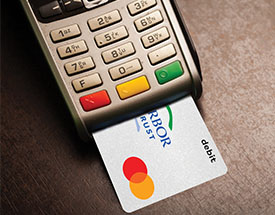Credit cards are one of the most prevalent forms of payment. A recent report by the Federal Reserve revealed that 60% of U.S. consumers use cards over cash. Even so, determining whether your business should accept credit cards can be a seemingly difficult decision. Do the benefits outweigh the costs? Are your cash margins big enough to cover the fees?
Unfortunately, too many merchants focus too much on cost and not enough on benefit. In today’s marketplace, you shouldn’t be asking if you can afford to accept credit cards, but if you can afford not to. If you want your business to be successful, now and in the future, accepting credit cards is more important than ever. Here’s why:
Your competitors are already accepting credit cards
Large retailers and online stores almost unanimously accept credit cards. Your competition already allows customers to pay with their preferred method, and if you want to keep up, you’ll have to as well. But more than half of U.S small businesses do not accept credit cards. It’s estimated that turning away plastic leads to a whopping $100 billion in missed sales for small businesses every year.
Put yourself in your customers’ shoes. You’re driving home from work and decide to stop somewhere for dinner. You’ve heard good things about a local restaurant, so you decide to go there. When you pull into the parking lot, there’s a sign on the front door that says, “Cash only.” But you don’t have any cash. So what do you decide to do?
Now, think about the scenario above, but with one of your potential customers. Do they want to do business with you so badly that they’ll drive to an ATM, withdraw cash (potentially paying a fee to do so), and drive back? Or will they just go to one of your competitors that does accept cards?
Preparing for the future means adjusting to spending trends
To build a successful business, you can’t just live in the now—you must prepare for the future. For credit cards, the present and future are looking bright. A recent Visa study found that 78% of consumers ranked credit cards as their preferred payment method. In addition, card and mobile payments are expected to rise in the next decade.
Change can be difficult, but if your business doesn’t adjust to spending trends, you’ll be left behind. Many consumers, especially younger consumers, no longer carry cash or checkbooks. Why would they, when they can pay all their bills online? A Federal Reserve study found that the number of payments made by check fell to 17.3 billion in 2016, down 2.5 billion since 2012.
Accepting credit cards now is incredibly important, but soon, it’ll be even more so.
Diversifying your business is growing your business
Technology has made it even easier to spend money. People can shop directly from their phones. Companies can even send customized product lists based on browsing history right to a potential buyer’s inbox. Consumers spend an average of $5,400 per person on impulse purchases per year. Besides food purchases, the majority of these impulse buys happen online.
Unless you want to extend a personal line of credit to your customers, not accepting credit cards means e-commerce and sales over the phone are off limits. This can stifle or even outright stop the growth of your business.
If you want to reach the greatest number of potential customers, accepting credit cards is a must. And not only will you have access to a wider audience, you’ll have access to a client base that’s likely to spend more.
Final Thoughts
Credit card processing can seem complicated. Especially for a lot of mom-and-pop shops and sole proprietorships, the maze of credit card processing appears hard to navigate.
Before you decide it’s not worth it, think about the future of your business. If you want to continue growing, it’s more important than ever to accept credit cards. With the right partner to guide you through the process, adding credit card acceptance to your business model will be quick and easy, and your business will reap the benefits.

 207-262-8305
207-262-8305